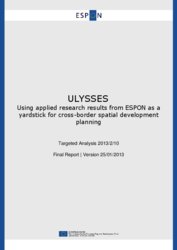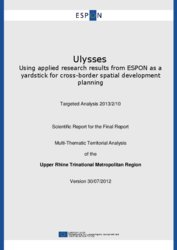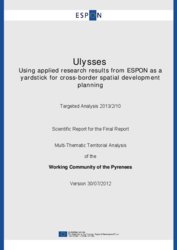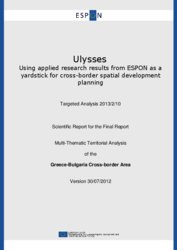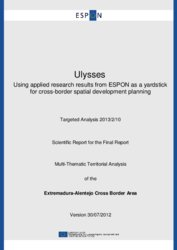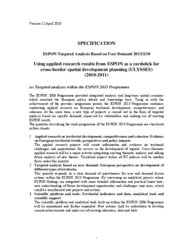ULYSSES - Using applied research results from ESPON as a yardstick for cross-border spatial development planning
Thematic scope
ULYSSES is an experimental and innovative project supported by 18 European border and cross-border areas, which aims at using applied research results from ESPON as a yardstick for decentralised cross-border spatial development planning.
Based upon a sound methodological approach, the targeted analysis is expected – as a first step – to establish high-quality and multi-thematic territorial analyses on six specific cross-border areas, which take into consideration future territorial challenges expressed in findings of the ESPON 2006 Programme and of the current ESPON 2013 Programme.
The targeted analysis will realise 6 comprehensive and multi-thematic territorial analyses as main outcomes and will deliver to cross-border areas a “reference baseline” on ground of which new cross-border spatial development concepts can be elaborated and / or already existing ones can be reviewed and up-graded. The strategic result of this element of the targeted analysis is therefore to lay the basis for launching - both technically and operationally - more comprehensive cross-border spatial development planning processes.
In addition the targeted analysis will elaborate 7 “data fact sheets” on the cross-border areas not covered by the six multi-thematic territorial analyses.
Please read more about the main areas of analysis and main results envisaged.
Stakeholders
- Alsace Region (Lead Stakeholder)
- Regio Basiliensis
- Regional Planning Board of the Middle Upper Rhine
- Regional Planning Board of the Southern Upper Rhine
- EUREGIO
- Prefectural Authority of Drama-Kavala-Xanthi
- Regional Council of North Karelia
- Government of Navarra, Department of Housing and Spatial Planning
- Regional Development and Spatial Planning Commission of Alentejo – Spatial Planning and Land Management Direction
- General Direction of Urbanism and Spatial Planning, Ministry of Building, Regional Government of Extremadura,
- The Öresund Committee
- Danube-Kris-Mures-Tisa Euroregion
- City of Szczecin
- EuRegio Salzburg-Berchtesgadener Land-Traunstein
- Autonomous Region of Friuli Venezia Giulia
- Working Community of the Pyrenees
- PI Nemunas Euroregion Marijampole Bureau
- Ems Dollart Region
Lead Partner
FUNDACIÓN TECNALIA RESEARCH & INNOVATION, Spain
Detailed information on the contracted project team can be found under Transnational Project Groups.
Budget: € 349,682.23
Project’s lifetime: September 2010 – July 2012
Delivery of Reports
Inception Report: 31 January 2011
Annex to Inception Report: 27 May 2011
Interim Report: 5 October 2011
Draft Final Report: 29 February 2012
Final Report: 30 April 2012
Publishing
Reports will be published once they are approved by the ESPON Monitoring Committee
More information
Please contact the Project Expert at the ESPON Coordination Unit:
Sara FERRARA, e-mail: sara.ferrara@espon.eu
Main areas of analysis
The project will make comprehensive territorial analyses for selected cross-border areas taking into consideration a range of important territorial issues and challenges pin-pointed by strategic European policy orientations and/or by recent ESPON applied research, such us:
- Cross-border polycentric development and patterns of urban-rural relationship in the cross-border areas.
- The cross-border areas’ levels of accessibility & connectivity to existing Trans-European transport corridors and modern ICT-infrastructures.
- Effects of demographic change in the cross-border areas (i.e. an increasingly ageing society, migration processes, social inclusion of minority groups), which are of particular importance for border areas located in national and European peripheries and also for borders areas located near Europe’s external borders.
- The performance of the cross-border areas in relation to the revised Lisbon/Europe 2020 Strategy objectives: e.g. main features of economic activities and of the economic environment in genetal, existing R&TD potentials and innovation processes; issues related to structural change / modernisation pressure due to an increasing globalisation, main features characterising the cross-border labour market within the context of a smart, sustainable and inclusive growth.
- The performance of the cross-border area in relation to various objectives of the Gothenburg Strategy: e.g. preservation and sustainable use of natural / cultural heritage potentials; sustainable management of main environmental media (soil, air, water etc), effects of climate change (e.g. new natural hazard patterns, natural disasters), renewable energy sources & use of renewable energy sources / increased energy efficiency; potential sources for industrial risks.
Main results envisaged
- Elaboration of six multi-thematic territorial analyses delivering to cross-border areas a “reference baseline” on ground of which new cross-border spatial development concepts can be elaborated and / or already existing ones can be reviewed and up-graded.
- Raising the stakeholders’ awareness and know-how about crucial issues that strongly condition the quality of cross-border spatial development concepts.
- Contribute to motivate other cross-border areas not directly covered by one of the pilot analysis to launch spatial development elaboration processes for their respective cross-border areas.
- Elaboration of seven “data fact sheets” constituting an operational input for the covered areas in understanding the European dimension of their development potentials and challenges.
- Elaboration of parts of the future “ULYSSES Practical Guide”, which will be published as a joint document of stakeholders involved in the project and the ESPON 2013 programme.
